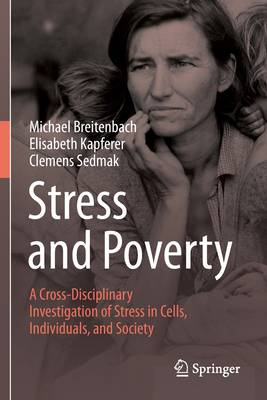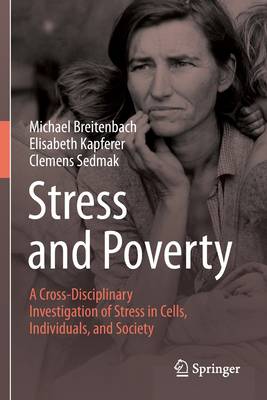
- Retrait gratuit dans votre magasin Club
- 7.000.000 titres dans notre catalogue
- Payer en toute sécurité
- Toujours un magasin près de chez vous
- Retrait gratuit dans votre magasin Club
- 7.000.0000 titres dans notre catalogue
- Payer en toute sécurité
- Toujours un magasin près de chez vous
Stress and Poverty
A Cross-Disciplinary Investigation of Stress in Cells, Individuals, and Society
Michael Breitenbach, Elisabeth Kapferer, Clemens Sedmak
Livre broché | Anglais
40,45 €
+ 80 points
Format
Description
The word stress is everywhere and highly overused. Everyone is stressed, it seems, all the time. Looking into the meaning of stress in the natural science and the humanities, this book explores cellular stress as cause of and in correlation with what humans experience as stress. When do we psychologically feel stress and when do we show physiological evidence of stress in our brain?
Stress is a deviation from what feels normal and healthy. It can be created by social or economic factors and become chronic, which has substantial impacts on the individual and society as a whole. Focusing on poverty as one chronic inducer of stress, this book explores how the lack of pressure-free time, the hardships and unpredictability of everyday life and a general lack of protection lead to destructive toxic stress. This pressure affects cognitive and social functioning, brain development during childhood and may also result in premature aging. How can the sciences informour understanding of and our response to stress? What can be done about toxic stress both on a personal level and in terms of structures and policies?
The book is written for anyone interested in stress, its causes and consequences, and its relationship to poverty.
Spécifications
Parties prenantes
- Auteur(s) :
- Editeur:
Contenu
- Nombre de pages :
- 234
- Langue:
- Anglais
Caractéristiques
- EAN:
- 9783030777401
- Date de parution :
- 24-07-22
- Format:
- Livre broché
- Format numérique:
- Trade paperback (VS)
- Dimensions :
- 156 mm x 234 mm
- Poids :
- 362 g

Les avis
Nous publions uniquement les avis qui respectent les conditions requises. Consultez nos conditions pour les avis.






